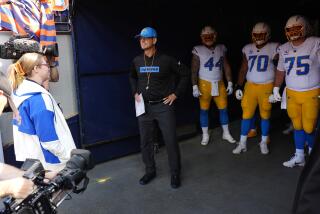Being a Winner Can Be Stressful
- Share via
Exactly what treasures Tampa Bay dangled before Bill Walsh to try to induce him to coach its football team isn’t clear. Offers in sports are like war reports. They can’t always be confirmed.
But there is reason to believe that what the Buccaneers proffered was big. And it is equally believable that Walsh was only toying with management, paying a debt to his Muse.
A three-time Super Bowl winner at San Francisco, earning major wages, Walsh left there ostensibly for two reasons.
First, and least important, he found it hard developing a fondness for the owner. In Walsh’s judgment, never meager, Bill built the 49ers.
The owner came to believe that he--the owner--built them. The owner may even have believed he built Walsh.
Naming Walsh president at one point, the owner would wrest that post from him, capturing the title for himself.
If Walsh fostered contempt for ownership, he never allowed it to surface. But, quietly, it was known. The contempt also was mutual.
Still, this wasn’t the principal reason Walsh quit coaching. He left mainly to avoid the stress that was beginning to seize him and spoil his life.
Walsh didn’t invent coaching stress. It had been driving colleagues from the game for decades . . . Frank Leahy, Ara Parseghian, Dan Devine, even Vince Lombardi.
It took the measure of Dick Vermeil who, leaving Philadelphia, has since rejected several coaching propositions.
Vermeil got to the Super Bowl one year. What also came in the package, he confided, were depression, anxiety, sleeplessness and fatigue.
He cried a lot, as people in that frame of mind often do. He suffered senseless guilt.
“I took an afternoon off one day to play in a charity golf tournament,” he told us. “The sky was blue. Beautiful sunshine. Birds chirping on the course. I felt great. Suddenly, it hit me. Why wasn’t I looking at film, getting ready for next week’s game? I grew miserable and went back to the office.”
Sid Gillman, the ancient warrior, once guessed that for every coach who admits stress, there are three who have it but deny it.
Laid low by a stomach ailment, believed to have been emotionally induced, Gillman quit his job one time at San Diego. He looked your correspondent firmly in the eye, raised his right hand and swore solemnly: “If you ever catch me on a football field again, I’ll be the dirtiest s.o.b. on the face of this earth.”
It was a vow Gillman wishes he never took. He soon was back coaching.
But John Madden never returned, not even hinted he might. The more stressful Madden grew on the job, the more his claustrophobic tendencies expanded. Stress and claustrophobia are well-known partners.
When the doors on an airplane were sealed, Madden ran a temperature. His pulse quickened. Perspiration poured from his face. On Raider trips, it was the job of a flight attendant to minister Madden full time with wet towels.
Discussing his stress problem with us, he explained he was the type of coach most vulnerable to it. He had no hobbies, no outside diversions. He worried excessively, often about things he couldn’t control. He worried about pleasing a tough owner.
Al Davis, who hired Madden, always has advanced the theory that one shouldn’t coach pro football more than eight years.
Beyond that point, says Davis, the effectiveness of most coaches is neutralized by the emotional pounding encountered. It’s like a quarterback repeatedly knocked down. The cumulative effect begins to tell.
Giving thought to the emotional pain attendant to coaching, George Allen contended that the only coaches who get depressed are those who lose.
But Walsh disproved that philosophy. A big-time winner, he would come to suffer such discomfort that it was whispered he enlisted therapeutic help to deal with it.
No doubt the best therapy was getting away from coaching.
So Walsh bowed out, and considering his history, you suspect he will stay out, reaffirming the theory that his so-called negotiation with Tampa Bay was simply an exercise to tickle his vanity and to impress those in charge of power at NBC, for which Bill now tills an oar.
Many will testify that coaching is no more stressful than television, which does worse things to the nervous system than photo finishes.
But the difference between coaching football and analyzing it on television is clear.
A coach can be wrong. A TV analyst? Never.
More to Read
Go beyond the scoreboard
Get the latest on L.A.'s teams in the daily Sports Report newsletter.
You may occasionally receive promotional content from the Los Angeles Times.










